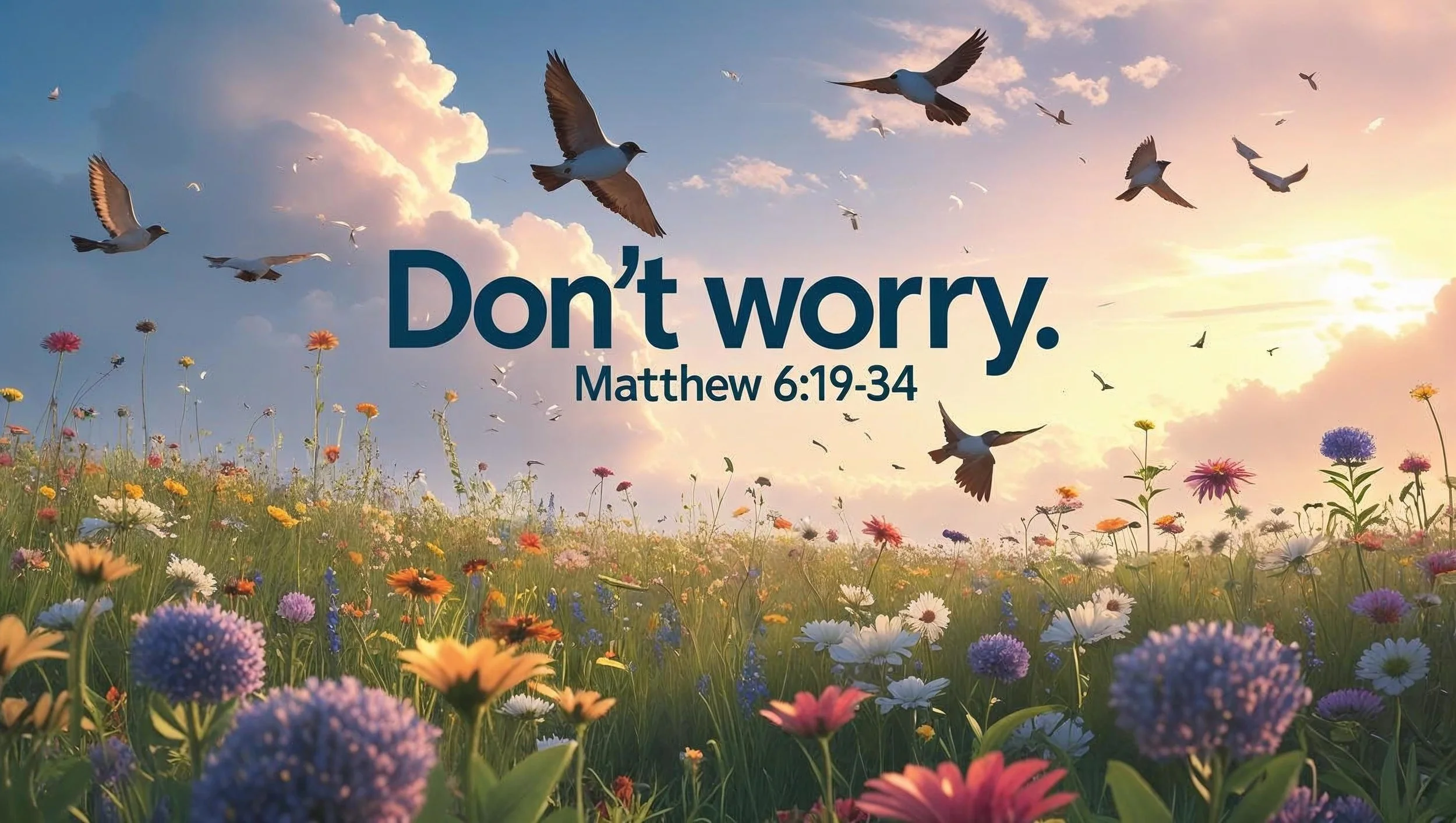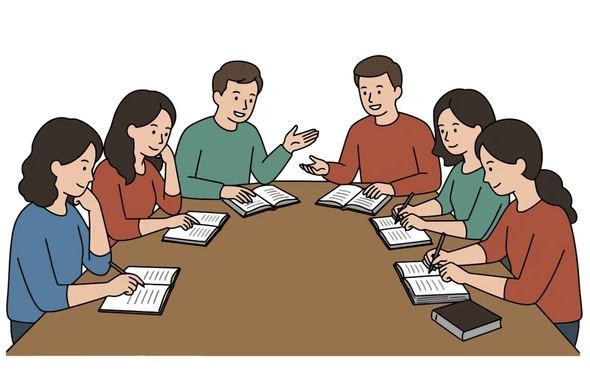Matthew 6:19-34 sits in the heart of the Sermon on the Mount, where Jesus is teaching what life looks like under the rule and reign of God. This is not a set of motivational quotes. It is an authoritative call to live with God as King, rejecting the false security and misplaced worship that define life apart from Him.
Jesus speaks these words to people in first-century Galilee, most of whom live on the edge of poverty. They understand the daily pressure of providing for their families, and they live in a culture where wealth is seen as a sign of stability and blessing. Yet, He warns them against storing up “treasures on earth” and serving “mammon” (wealth as a master). His point is theological, not just practical: your heart will follow your treasure, and you cannot give your ultimate loyalty to both God and possessions.
From there, He moves to the subject of worry but not as a casual suggestion, but as a Kingdom command. He shows that anxiety over food, drink, and clothing flows from a failure to trust the Father’s care. God provides for the birds and clothes the lilies, and His people are of far greater value. Worry does not change the future, but it does reveal where our trust truly lies.
The climax of the passage is verse 33: “But seek first the kingdom of God and his righteousness, and all these things will be given to you as well.” This is not a promise that God will give us everything we want, but that He will meet the needs of those who put His reign and His righteousness first.
This teaching is radically countercultural. In the first century, it confronted a culture shaped by status, possessions, and fear of scarcity. In our century, it confronts consumerism, materialism, and the constant anxiety that comes from chasing security apart from God. Jesus is not simply telling us to “worry less,” He is calling us to reorder our entire lives under the reality that God rules, God provides, and God is worthy of our undivided loyalty.
Over the next three weeks, we will explore this passage in three parts:
Treasure and loyalty (v19-24)
God’s care for creation (v25-30)
Seek first the Kingdom (v31-34)
This is not an optional teaching for when life is easy. It is the daily posture of every disciple who chooses to trust the King instead of the world.
Matthew 6:19-24 (NIV)
19 Do not store up for yourselves treasures on earth, where moths and vermin destroy, and where thieves break in and steal. 20 But store up for yourselves treasures in heaven, where moths and vermin do not destroy, and where thieves do not break in and steal. 21 For where your treasure is, there your heart will be also. 22 “The eye is the lamp of the body. If your eyes are healthy, your whole body will be full of light. 23 But if your eyes are unhealthy, your whole body will be full of darkness. If then the light within you is darkness, how great is that darkness! 24 “No one can serve two masters. Either you will hate the one and love the other, or you will be devoted to the one and despise the other. You cannot serve both God and money.
What you treasure reveals your true master.
Jesus begins this section of the Sermon on the Mount by challenging how His followers prioritize their lives. In a world where people measure security and success by possessions and status, Jesus points to a higher reality: the Kingdom of God. He calls His followers to store up treasures not on earth, but in heaven where they are secure, eternal, and beyond the reach of decay, theft, or loss.
Matthew 6:19-21
“Do not store up for yourselves treasures on earth…”
Earthly treasure is temporal and vulnerable to decay and theft. Jesus contrasts this with heavenly treasure, which is eternal, imperishable, and secure under God’s care.
This highlights the principle of eschatological hope: believers live in the present world but store their hope in the coming Kingdom of God.
“For where your treasure is, there your heart will be also.”
Treasure is not just about money; it includes anything we value most, be it our time, energy, relationships, influence.
The heart is the theological center of human life (Deuteronomy 6:5, Proverbs 4:23). What we treasure determines our worship, priorities, and ultimate trust.
Matthew 6:22-24
“The eye is the lamp of the body…”
Jesus uses a metaphor emphasizing perception and intention. The “eye” represents focus and vision. A healthy (single) focus illuminates life; a divided or corrupt focus darkens it.
This reflects human inclination toward idolatry or anything that competes with God for ultimate loyalty distorts our life vision.
“No one can serve two masters…”
The word “serve” (Greek: douleuō) implies slavery or complete obedience. Serving God requires exclusive allegiance. Serving mammon or as we would call it wealth as a master results in moral compromise, anxiety, and spiritual instability.
This verse reveals a fundamental truth of discipleship: loyalty is not optional. God’s Kingdom calls for undivided devotion.
Key Insights
True discipleship is measured by what we value, not just what we do externally.
Earthly security is fleeting; heavenly investment is permanent.
God requires the whole heart; divided loyalties lead to spiritual instability.
Mammon is not just money, but anything that becomes the object of ultimate trust and devotion.
Questions for Self-Study
What do you treasure most, and how does it shape your daily choices?
Are there areas in your life where you feel torn between God and something else?
How might you reorient your heart to prioritize heavenly treasures over earthly ones?
In what ways can material pursuit interfere with obedience, generosity, and faith?
Jesus’ teaching in Matthew 6:19-24 calls every disciple to a radical evaluation of loyalty. Treasure is not neutral but it shapes the heart, defines trust, and determines spiritual freedom. This passage invites us to examine our lives deeply, confront idolatry, and intentionally align our hearts with God’s Kingdom.
Ephesians 3:14–21 (ESV)
14 For this reason I bow my knees before the Father,
15 from whom every family in heaven and on earth is named,
16 that according to the riches of his glory he may grant you to be strengthened with power through his Spirit in your inner being,
17 so that Christ may dwell in your hearts through faith—that you, being rooted and grounded in love,
18 may have strength to comprehend with all the saints what is the breadth and length and height and depth,
19 and to know the love of Christ that surpasses knowledge, that you may be filled with all the fullness of God.
20 Now to him who is able to do far more abundantly than all that we ask or think, according to the power at work within us,
21 to him be glory in the church and in Christ Jesus throughout all generations, forever and ever. Amen.



